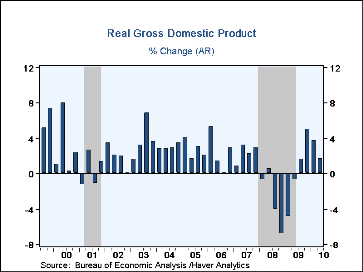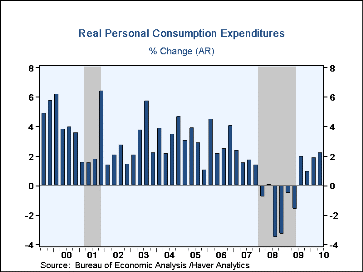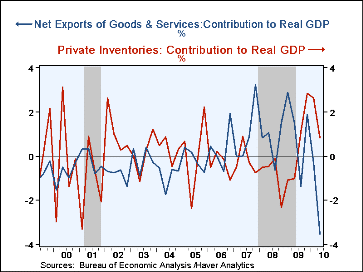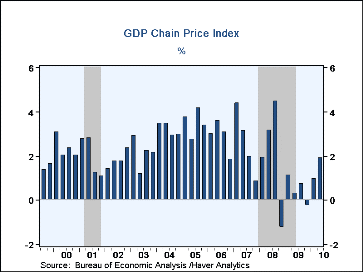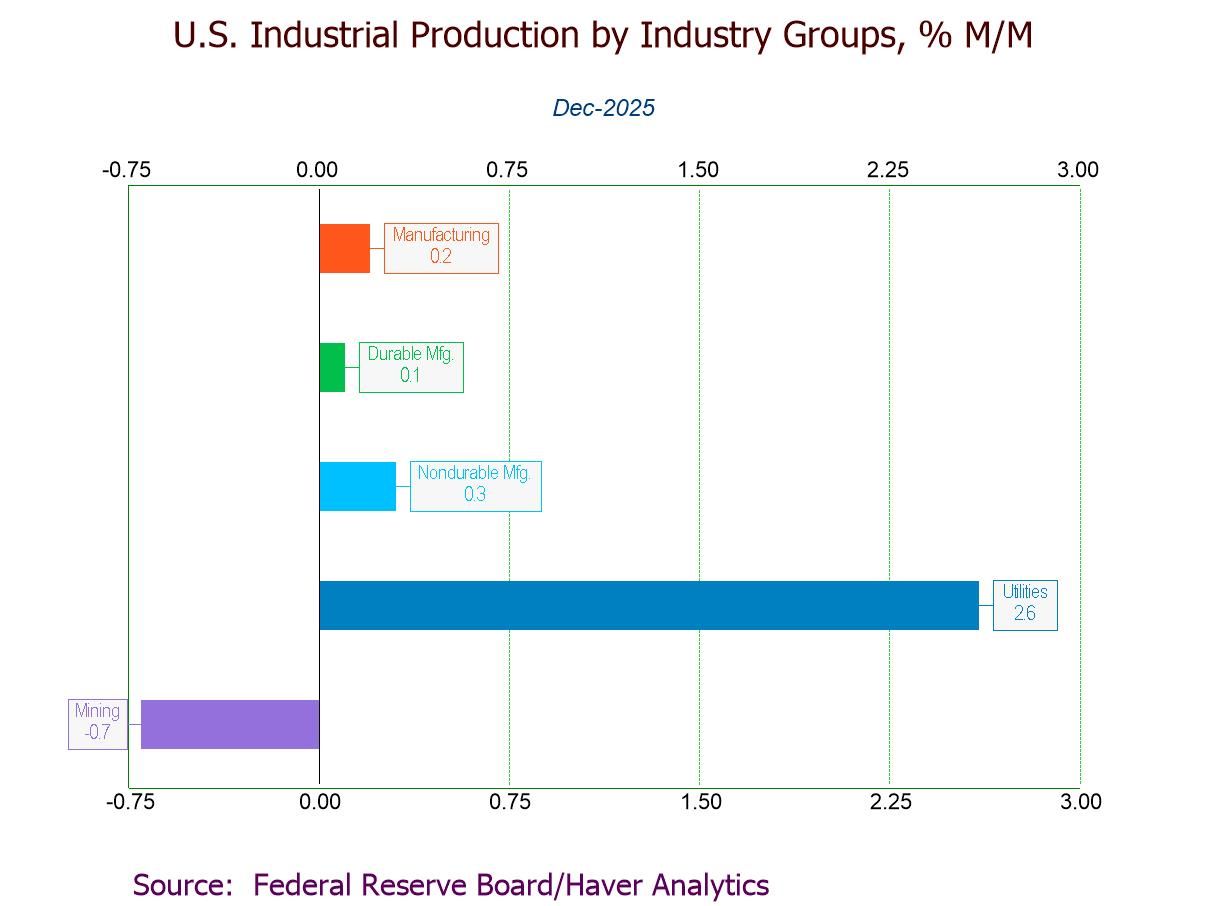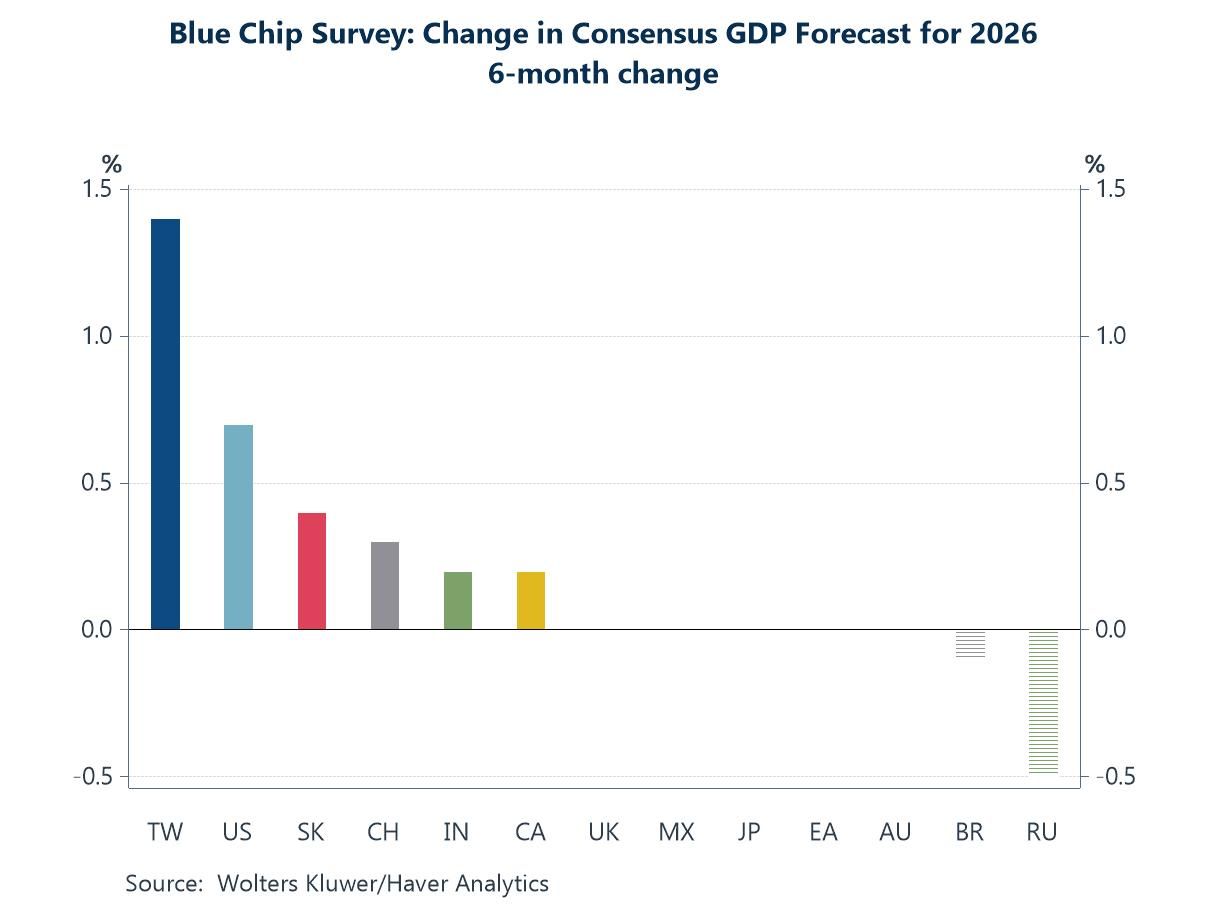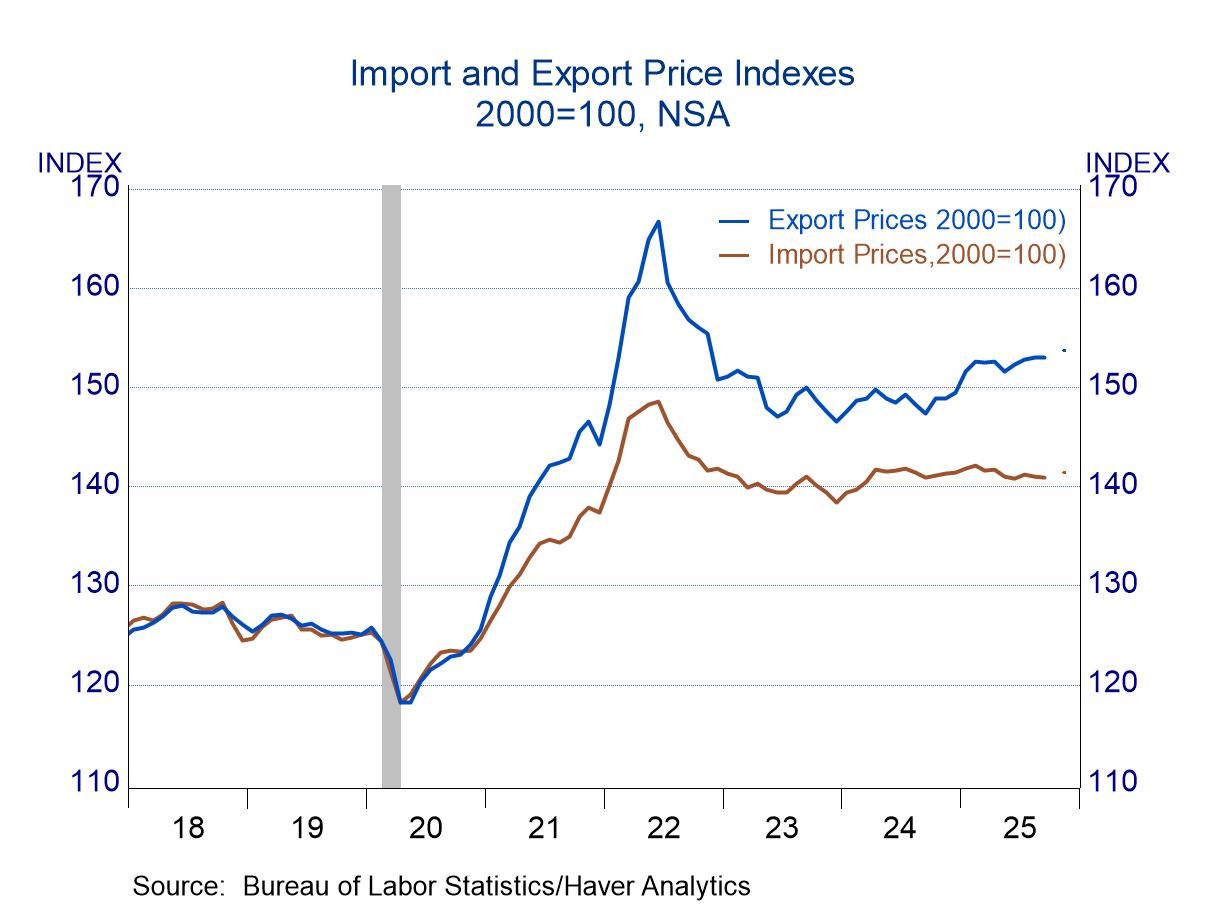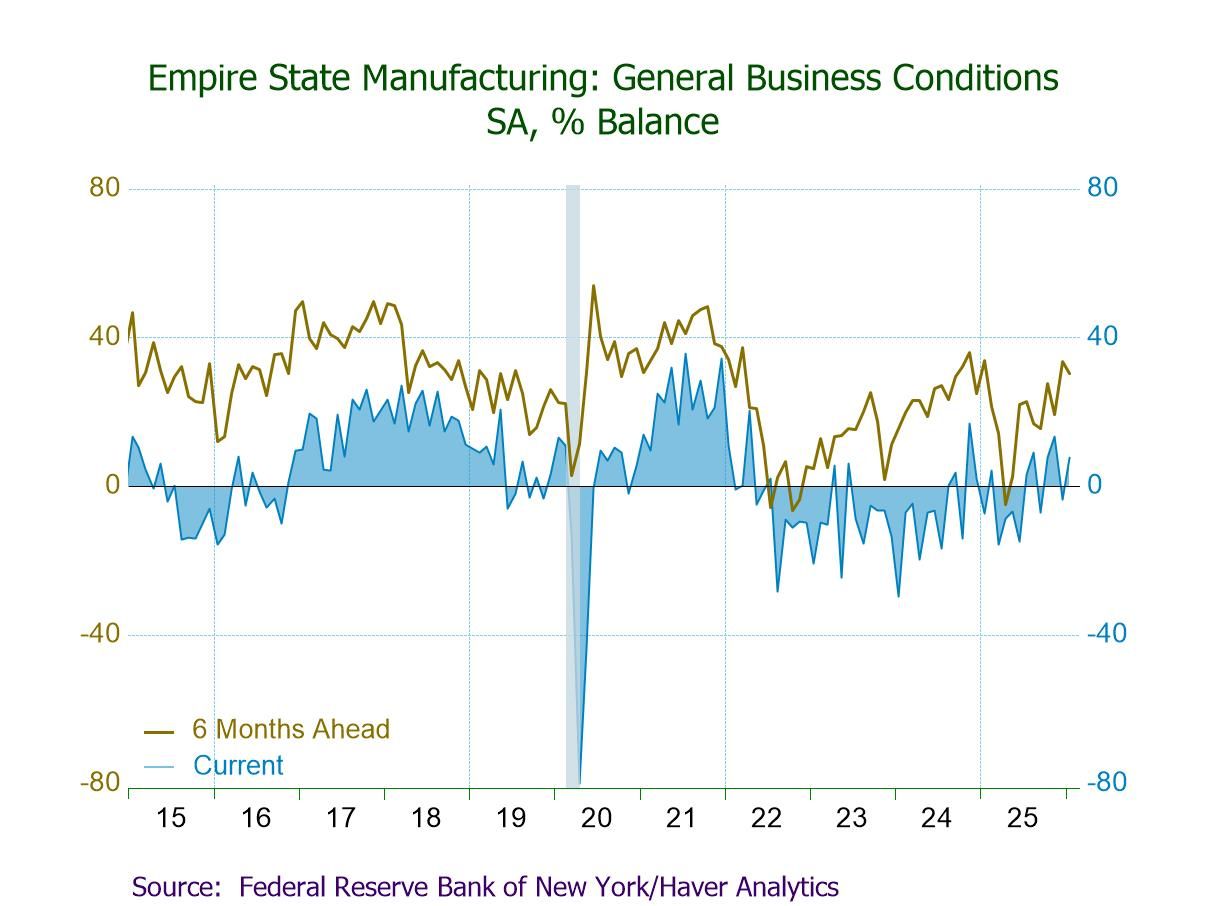 Global| Sep 30 2010
Global| Sep 30 2010Real GDP Q2 Growth Revised Little
by:Tom Moeller
|in:Economy in Brief
Summary
The latest estimate of 1.7% (AR) growth in real Q2 GDP was little revised from last month's 1.6%. Moreover, it differed little from the Consensus expectation for an unchanged reading of 1.6%. It remained the fourth straight quarter of [...]
The latest estimate of 1.7% (AR) growth in real Q2 GDP was little revised from last month's 1.6%. Moreover, it differed little from the Consensus expectation for an unchanged reading of 1.6%. It remained the fourth straight quarter of positive GDP growth since the recession's end. However, the 3.0% growth during that period remained less than half the norm for the year following other deep postwar recessions. For the remainder of 2010, growth is expected to average 2.1%, according to a Bloomberg survey.
The contribution to growth from inventory accumulation was little-revised at 0.8 percentage points. The subtraction from growth due to foreign trade deficit deterioration also was little-changed at 3.5 points as exports grew 9.1% (14.1% y/y) while imports gained 33.5% (17.4% y/y).
Growth in domestic final demand was unchanged at 4.3% (AR) as personal consumption grew 2.2% (1.7% y/y). Business fixed investment growth also was little-changed at 17.2% (5.2% y/y). Last quarter's strength was led by a 15.7% y/y surge in equipment spending. Investment in new structures fell 0.5% (-15.6% y/y). The rebound in residential investment also was barely touched at 25.6% (4.9% y/y). Government spending also was little-revised at 3.9%. It reflected a 9.1% rise (4.1% y/y) in Federal government expenditures and a 0.6% gain (-1.6% y/y) in state & local spending.
Corporate profit growth was revised slightly lower to 3.0% (37.0% y/y), remaining the weakest of the last four quarters. Weaker or negative growth across sectors accounted for the slowdown. Nonfinancial sector earnings led last quarter's gain with a 5.7% increase (43.9% y/y) while earnings from abroad nudged up 0.7% (17.4% y/y). Financial sector earnings slipped 1.0% from 1Q but the steep interest rate yield curve kept them up 47.0% y/y.
Price inflation as measured by the chained GDP price index was unchanged at 1.9%. The y/y increase of 0.8% remained near the lowest reading (0.2%) since the early-1950s. The personal consumption chain price index slipped marginally and the 1.9% year-to-year gain remained nearly the quickest since 2008, due largely to higher energy prices. The price index for fixed business investment also slipped q/q (-2.4% y/y) and the residential investment price index fell at a 3.2% rate (-0.5% y/y).
Regulatory Reform Implementation is the title of today's speech by Fed Chairman Ben S. Bernanke and it can be found here.
| Chained 2005 $, % AR | Q2'10 (Final) | Q2'10 (Prelim.) | Q2'10 (Adv.) | Q1'10 | Q4'09 | Q2 Y/Y | 2009 | 2008 | 2007 |
|---|---|---|---|---|---|---|---|---|---|
| GDP | 1.7 | 1.6 | 2.4 | 3.7 | 5.0 | 3.0 | -2.6 | -0.0 | 1.9 |
| Inventory Effect | 0.8 | 0.6 | 1.1 | 2.6 | 2.8 | 1.9 | -0.5 | -0.5 | -0.3 |
| Final Sales | 0.9 | 1.0 | 1.3 | 1.1 | 2.1 | 1.1 | -2.1 | 0.5 | 2.2 |
| Foreign Trade Effect | -3.5 | -3.4 | -2.8 | -0.3 | 1.9 | -0.8 | 1.0 | -1.1 | 0.7 |
| Domestic Final Demand | 4.3 | 4.3 | 4.1 | 1.3 | 0.2 | 1.9 | -3.1 | -0.6 | 1.5 |
| Personal Consumption | 2.2 | 2.0 | 1.6 | 1.9 | 0.9 | 1.7 | -1.2 | -0.3 | 2.4 |
| Business Fixed Investment | 17.2 | 17.6 | 17.0 | 7.8 | -1.4 | 5.2 | -17.1 | 0.3 | 6.7 |
| Residential Investment | 25.6 | 27.1 | 27.8 | -12.3 | -0.8 | 4.9 | -22.9 | -24.0 | -18.7 |
| Government Spending | 3.9 | 4.3 | 4.4 | -1.6 | -1.4 | 0.6 | 1.6 | 2.8 | 1.3 |
| Chained GDP Price Index | 1.9 | 1.9 | 1.8 | 1.0 | -0.2 | 0.8 | 0.9 | 2.2 | 2.9 |
Tom Moeller
AuthorMore in Author Profile »Prior to joining Haver Analytics in 2000, Mr. Moeller worked as the Economist at Chancellor Capital Management from 1985 to 1999. There, he developed comprehensive economic forecasts and interpreted economic data for equity and fixed income portfolio managers. Also at Chancellor, Mr. Moeller worked as an equity analyst and was responsible for researching and rating companies in the economically sensitive automobile and housing industries for investment in Chancellor’s equity portfolio. Prior to joining Chancellor, Mr. Moeller was an Economist at Citibank from 1979 to 1984. He also analyzed pricing behavior in the metals industry for the Council on Wage and Price Stability in Washington, D.C. In 1999, Mr. Moeller received the award for most accurate forecast from the Forecasters' Club of New York. From 1990 to 1992 he was President of the New York Association for Business Economists. Mr. Moeller earned an M.B.A. in Finance from Fordham University, where he graduated in 1987. He holds a Bachelor of Arts in Economics from George Washington University.


